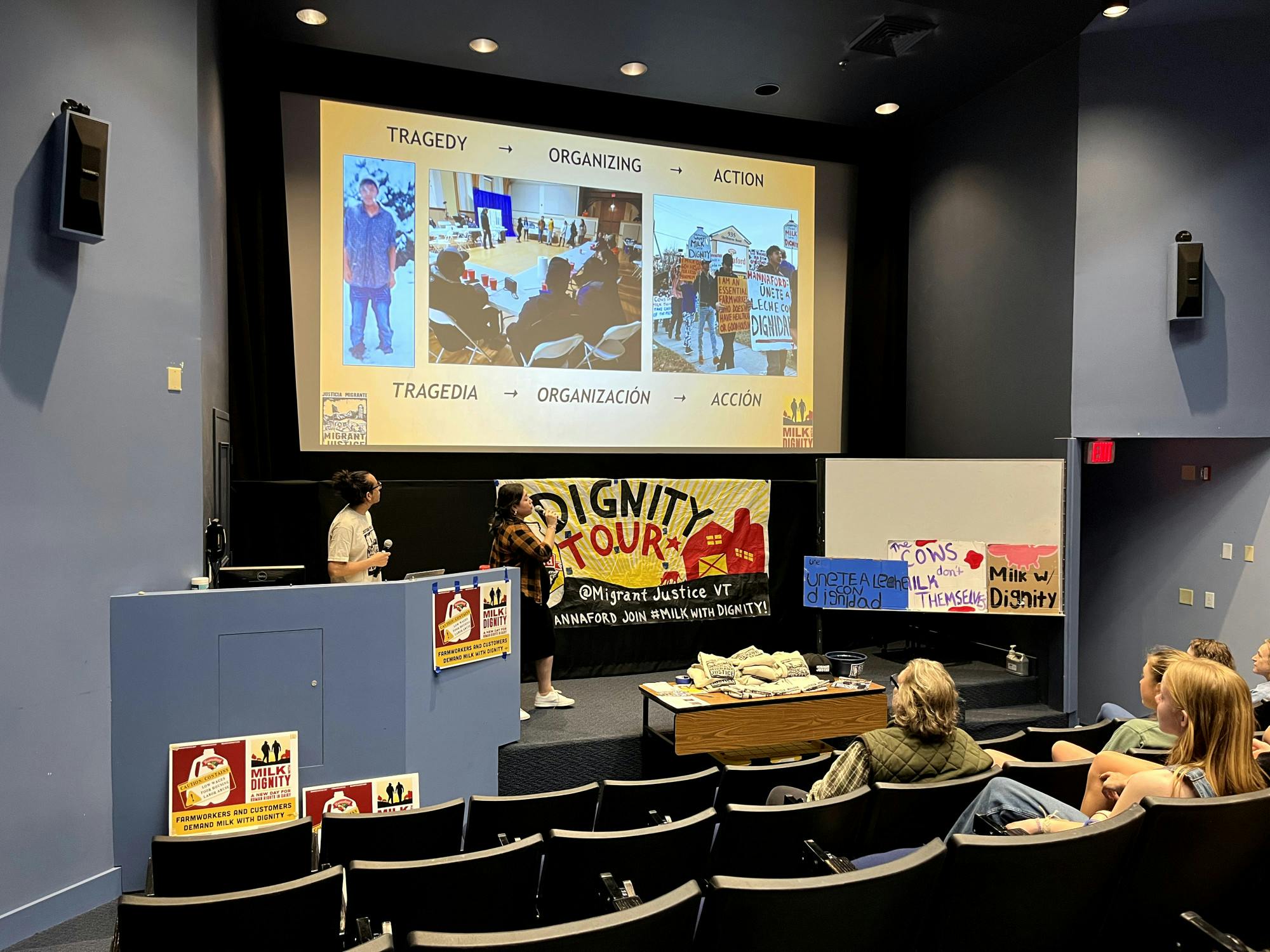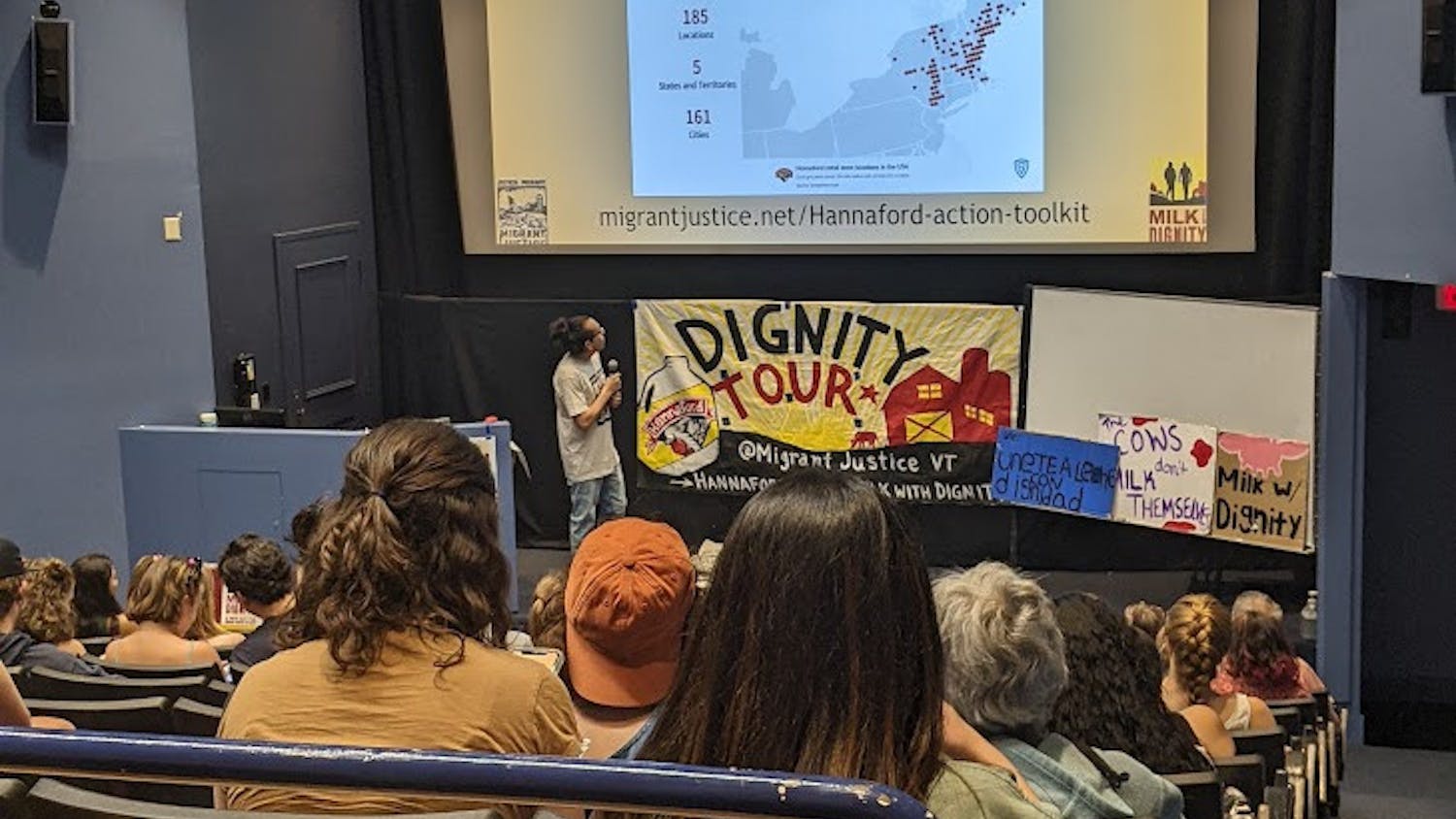Students and community members gathered on Friday, April 21 outside the Hannaford supermarket at 260 Court St. in Middlebury to protest unfair treatment of migrant farm workers by the supermarket chain. The protesters chanted slogans in both Spanish and English, demanding that Hannaford acknowledge the alleged substandard living and working conditions of the migrant farm workers who supply its dairy products.
The protest was a part of advocacy organization Migrant Justice’s “Milk With Dignity” campaign and was organized in collaboration with Juntos, the college’s student-migrant solidarity network. This April the “Organizing Tour” has visited colleges and organizations across the seven northeastern states that have Hannaford stores.
Out of the approximately 21,000 farm workers in Vermont, Migrant Justice estimates that around 1,500 are migrants who face discrimination and are excluded from legal worker and housing rights protections that are afforded to other farm workers.
“The Milk with Dignity campaign builds a movement of farmworkers and allies calling on dairy companies to ensure respect for human rights in their supply chains,” Migrant Justice’s website reads.
After signing the first ever Milk With Dignity Agreement in 2017 with Ben and Jerry’s, bringing 72 farms that supply the multinational ice cream company into the Milk With Dignity Program, Migrant Justice shifted its campaign focus towards advocating for the Hannaford supermarket chain to join the program.
Prior to the protest, Migrant Justice field organizers Thelma Gomez and Abel Luna gave a presentation about Milk With Dignity in Twilight Hall. Gomez spoke in Spanish and Luna spoke in English.
They spoke on the conditions many migrant workers face on farms. “A normal work week for workers is between 60 to 80 hours per week,” Luna said. “A lot of [workers] don't have a day off, a lot of people are working below the state's minimum wage, and a lot of the housing that is provided is inadequate for humans to live in.”
Gomez shared her personal experience of her first paycheck being withheld by her employer. “They told me that basically I was going to be paying rent and not getting any money,” Luna translated as Gomez spoke. The presentation also included a migrant worker’s video testimony about an injury he says he suffered after Hannaford’s complaint line failed to address unsafe equipment.
Gomez and Luna then introduced the Milk With Dignity program as an enforceable, viable solution that could improve migrant farm workers’ conditions in a short time span. The program introduces a code of conduct that participating corporations would require all its supplier farms to follow. A third-party monitoring body, called the Milk With Dignity Standards Council, enforces adherence to the code.
In response to audience members’ questions about why the campaign targeted corporations rather than state law, Luna cited the Vermont Department of Labor’s slow response times.
“The state of Vermont has limited capacity when it comes to enforcement,” Luna said. “We needed a mechanism that was going to have immediate results.”
Gomez and Luna also emphasized that Migrant Justice understands how struggling dairy farms face economic incentives to lower their employees’ working and living standards. “Our fight is not with the farm. Our fight is with the big corporations,” Luna said. Under the Milk With Dignity program, corporations would pay a premium to supplier farms and farm workers complying with the Code of Conduct’s standards.

Audience members shared previous experiences protesting.
Oliver Buzzard ’22.5 learned about and started working with Migrant Justice in the summer of 2022. “I did a little bit of tabling at this Hannaford [in Middlebury] and went to a summer protest in Williston,” Buzzard said.
Around 20 members of the assembled audience in Twilight joined the demonstration on Friday outside of Hannaford. The demonstration began in the store, and later the protestors moved outside to the parking lot after they were escorted out by the store’s Assistant Manager Jonathon Edwards.
The demonstrators, who included a group of migrant workers, spoke to Edwards about the Milk With Dignity campaign and the abuses that migrant workers suffered in farms that supplied dairy to Hannaford. The demonstrators requested that Edwards relay this information to the CEO of Hannaford, Michael Vail. Edwards maintained a polite tone with the protestors, but refused to take any informational materials on the program. When asked for his thoughts on the protest, he replied that he personally could not give any comments. Edwards then returned to the store.
Protesters chanted slogans demanding that Hannaford join the Milk With Dignity program. As cars passed by, they occasionally honked in support, spurring cheers from the protestors.
Many of the people who attended the protest were members of Juntos. Laura Rivera ’23, one of the protesters, began as a tutor with the student organization in her first year and became vice president this year.
Nancy Rivera ’26 also joined Juntos in the fall of 2022. “I worked with undocumented migrants through a program to help them get to college, so it's something that I've always liked to do. I wanted to come to college and still continue in some respect,” Nancy Rivera said. “So when I found Juntos, I was like, ‘Oh, this is for me’.”
Before the pandemic, Juntos’s community outreach branch was more deeply involved with the Milk With Dignity campaign, but that collaboration stalled during the pandemic.
“It sort of slipped the consciousness of Juntos,” said President of Juntos Damaris Neaves ’24. “It was brought back to life by a group of seniors [last year]. They really wanted to support Migrant Justice and Milk With Dignity coming back on campus and turned to Juntos. It was really a collaborative process between that student collective and Juntos.”
Lili Platt ’25 is an active part of this collective. “I've been working with Migrant Justice for the past few years and organizing with the student collective that’s been doing Milk With Dignity and outreach with Migrant Justice,” they said. “It’s a tangible version of unity and collaboration.”
Platt commented on the protest’s connection to a larger movement. “I also think of the generations and generations of so many people who’ve resisted labor abuse — it’s very invigorating,” they said.
In addition to facilitating the Milk With Dignity event, Juntos is also planning a community soccer event with migrant workers involved in its English tutoring program, as well as a catered dinner to be held in Atwater in May with Doña Alejandra, a migrant chef and business owner that Juntos helped to register as a caterer for the college. Juntos is also working with Middlebury Distinguished Men of Color to organize the group‘s annual spring block party.
“We’re in the space of wrapping up [for the semester],” Neaves said. She also hopes to recruit more people to join Juntos next year and be in leadership positions.
“It is a lot of work, but [Juntos] has grown into something unique and necessary for the community,” Neaves said.




